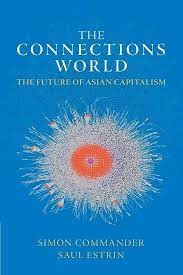Promotion of the book 'The Connections World' by Simon Commander and Saul Estrin
CASE cordially invites you to a special event. An intriguing conversation between Professor Marek Dąbrowski and the author of the book "The Connections World", Simon Commander. The event will take place on October 31st at 2:00 PM in a hybrid format. We invite you to register for this exclusive meeting.

Date: Tuesday, October 31st 2023, 2.00 PM
Place: ZOOM & CASE Office, Warsaw (01-165 Warsaw, 5 Zamenhofa Street #1b)
Registration:
- online event: https://us06web.zoom.us/webinar/register/WN_FI22U8_hSXK4htrh-pwGLg
- meeting in person: https://us9.list-manage.com/survey?u=088ba777e100f163f345ad221&id=5cade8bf90&attribution=false
The event will focus on the book by Simon Commander & Saul Estrin titled “The Connections World”. This will shine a light on issues in Asia where strong connections between businesses and politicians could potentially cause problems and hinder Asia's progress in the 21st century.
- The book will be presented by Simon Commander, author, Managing Partner of Altura Partners and Visiting Professor of Economics at IE Business School in Madrid, member of the CASE Advisory Council,
- The discussion will be moderated by Prof. Marek Dąbrowski, a Non-Resident Scholar at Bruegel, co-founder and Fellow at CASE - Centre for Social and Economic Research in Warsaw and Visiting Professor at the Central European University in Vienna.
Agenda
14.00 – 14.30 Presentation by Simon Commander
14.30 – 15.15 Discussion
15:15 – 15:30 Q&A with Simon Commander
The meeting will take place at the CASE headquarters and on the Zoom platform. Individuals who wish to participate and ask questions to the author can join the meeting after registering in advance.
About the book
The book “The Connections World” by Simon Commander and Saul Estrin offers a fresh perspective on Asian success by delving into the intricate web of networks and connections among businesses and between businesses and governments. Drawing on new empirical material and historical data, the authors argue that while the connections world has played a vital role in Asia's economic achievements, it also poses significant challenges for the future. The book, praised by scholars and experts, sheds light on the strengths of Asia's politics and business networks in fostering development and prosperity, emphasizing their flaws as well. It critically examines Asia's deeply embedded networks of business groups, powerful families, and governments, which contributed significantly to its economic success by compensating for weak institutions. However, as many Asian economies transition into innovation-driven growth, these networks could impede further progress by stifling competition and creativity. The book serves as essential reading for researchers and policymakers interested in sustainable economic growth in Asia and beyond. It offers a nuanced perspective on the Asian model, emphasizing the complexities of family ties, trust, and porous relations between the state and the private sector, challenging conventional dismissals of 'crony capitalism.' In an era where the competition between liberal and political capitalism intensifies, this book provides valuable insights into the future trajectory of Asian economies, particularly in the face of 21st-century challenges.
